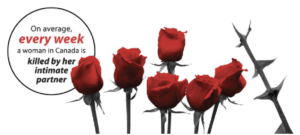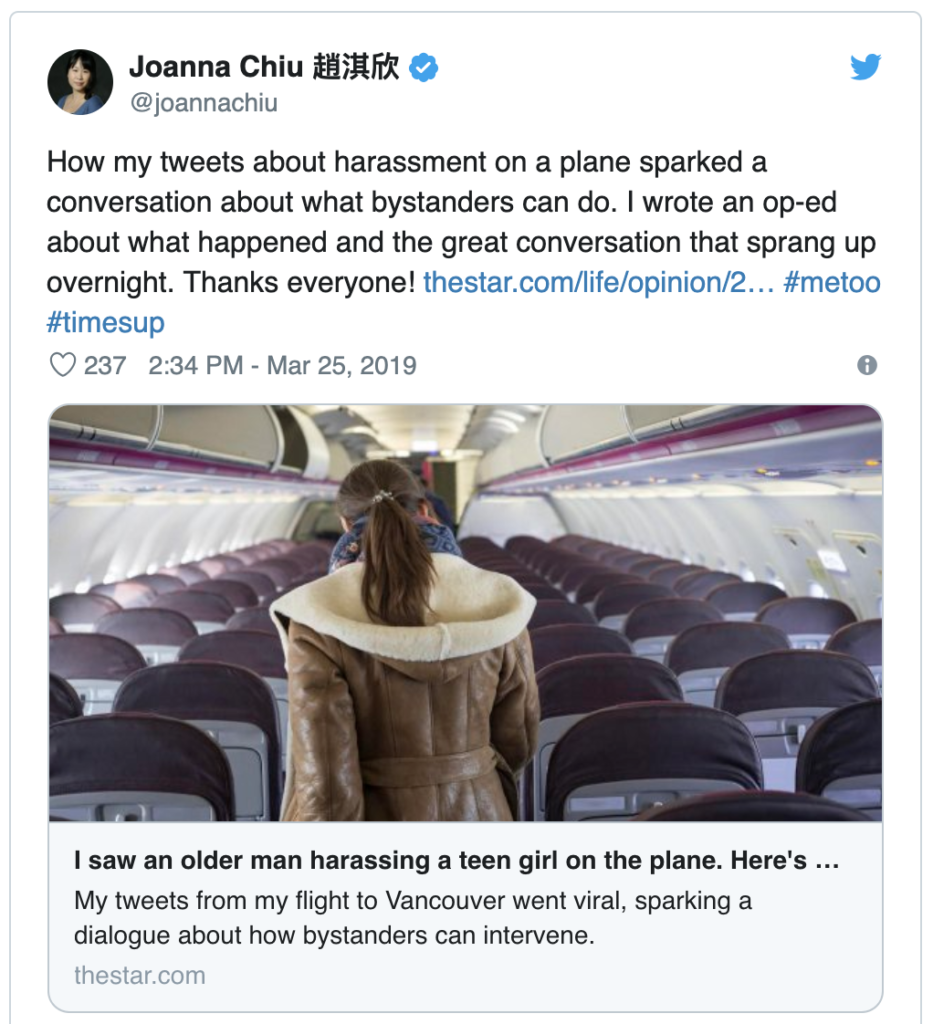 This post is excerpted from What You Should Do When Someone Is Being Sexually Harassed on Public Transportation
This post is excerpted from What You Should Do When Someone Is Being Sexually Harassed on Public Transportation
By Joanna Chiu, BWSS, March 26, 2019
https://mailchi.mp/bwss/bystander-intervention-on-public-transportation-1265291?e=c5d6fe9959
Not a usual topic but one that’s an everyday occurrence for many: sexual harassment on public transport.
What is sexual harassment on transit?
• Comments about appearance, gender or sexual orientation
• Sexually explicit comments e.g., “Hey! You’re hot wanna get busy with me?”
• Vulgar gestures, leering, whistling, barking, making kissing sounds
• Following someone, flashing or exposing oneself, blocking someone’s path
• Sexual touching or grabbing
• Public masturbation
What to do?
Recently, Canadian journalist, Joanna Chiu, shared an experience of witnessing sexual harassment on a flight via Twitter, sparking a discussion of the role of bystanders.
The thread is below, along with a resource created by Battered Women’s Support Services on what bystanders can do when someone is being harassed, and info from an article in HuffPost called, “Viral Twitter Threads On Sexual Harassment Have People Asking, ‘How Do I Step In?'”
Despite high levels of incidents, sexual harassment remains largely unreported.
This behaviour — so normalized by us — should be addressed more publicly.
It cannot continue.

It’s everyone’s responsibility to step in when they see harassment, experts say. JUPITERIMAGES VIA GETTY IMAGES
Twitter — Joanna Chiu 趙淇欣 (@joannachiu) March 25, 2019:
A man appearing in his late thirties was obviously delighted to be seated next to a teenager separated from the rest of her family. He started off by asking about her career plans and laughed when she said she wanted to be CEO and kept giving her ridiculous advice.
She was friendly and he seemed to take that as a welcome cue to get very familiar and started teasing her and kept saying that he wanted to take her out to eat, which she was ignoring. At this point I had to stay awake in case anything went further than that.
It did, and as soon as he asked for a “dirty” photo while leaning close to her I turned around and rage-whispered exactly what I thought of that and he didn’t say anything back and went off to use the washroom.
Another woman seated behind him was listening and monitoring too and while the man was gone she let the teen know that she had the right to change seats and that she was just behind her if she needed any help. I went to get a flight attendant and informed her of what was going on
They checked other witness accounts and the head of the flight service (a woman) asked the man to move. He resisted then started swearing at me and asked to talk to the boss and the head flight attendant said “I’m the boss, this is really serious and we could land the plane.”
He moved. The attendants checked in with the young woman and wrote up a report. They handled the situation well as far as I could tell, and it’s good to know other adult women passengers on the plane were paying attention and taking action while trying not to embarrass the teen.
But none of the male passengers seemed to show they noticed what was going on. Maybe fellow women are more likely to pick up on warning signs early on in the conversation because we used to be teenage girls too?
The first time I traveled without my parents the man next to me spoke with me most of the flight, which made me feel adult and important, and he said things like I must be flirting because I was touching the zipper on my jacket. To his credit he stopped and later looked ashamed.
The second time I traveled alone an older man struck up a convo while we waited for boarding and he asked about many details of my travels then kissed me without my consent. I was too shocked to say anything.
All adults need to be on guard and know there are things we can do to intervene even when a crime hadn’t technically been committed yet. Men need to figure out how to “spot creeps” in their vicinity as well and men can help too to prevent harassment or assault.
It’s so disturbing there are predatory people out there who act like they have no idea what they’re doing is wrong. It’s unclear if the man is going to be monitored by flight crew the next time he flies.
Just walked off the plane and security was ready to pull him aside to talk to him and he looked like he was sweating bullets.
I don’t want to say name of airline because journalists have to be careful not to make endorsements but just want to say that this Canadian airline crew handled the situation so well. Workplaces, schools, sports teams etc. can take note. They even gave me and other woman a card. pic.twitter.com/6irPimuRZb
BWSS #TransitTuesday Brochure
https://www.bwss.org/wp-content/uploads/2015/11/BWSS-Transit-Tuesday-Brochure.pdf
Bystanders to sexual harassment on public transportation give the following reasons why they don’t intervene:
• It’s not my problem
• Nobody else is doing anything
• It’s no big deal… right?
• I don’t know what to do
• I don’t want to get my butt kicked
• I can’t make a difference
• I don’t want to be late for work/school
• I don’t want to make a big deal about it
• It’s my friend who is sexual harassing
Survivors speak
“I was almost as injured by the bystanders on the bus doing nothing as I was by the three men who intentionally pushed their crotches into my face as they exited the bus after calling me a slut.”
“Bystanders who have the ability to intervene doing nothing, or actually just turning their backs, putting their earphones in — they are participating in the attack.”
“What the guy did was horrible and what made it worse was everyone else on Skytrain who witnessed the assault and did nothing.”
Bystanders be silent no more
Below are a few actions we can take to make a difference.
Rolling solo
• “Hey knock it off.”
• “Are you ok?”
• Stand next to the woman being targeted so they know they are not alone.
• Ask the woman, “Are they bothering you?”
• Take a picture with your phone.
• Look disapprovingly at the person doing the harassing behaviour.
• Offer to get off at the next stop with the woman and catch the next train together.
• Don’t join in or laugh.
• Loudly say, “Ugh, that is so gross.”
Squad
• Tell a transit authority worker.
• Yell “Somebody do something!”
• Get a group together to intervene.
• Call 911 or contact Transit Police by texting 87-77-77
• Text a friend who is with you and ask them to HELP!
• Make eye contact with some other bystanders and ask, “What should we do to help?”
Stealth moves
• Ask for directions.
• Offer the woman your seat.
• Act like you know the woman and say “I’ve been looking everywhere for you – we have to hurry to meet our other friends.”
• Drop your bags to create a commotion.
Always consider your safety when deciding when, if and/or how to intervene.
SOURCES:
Green Dot Etcetera Strategy
Hollaback Vancouver
Metro Vancouver Transit Police
Translink Harassment

Viral Twitter Threads On Sexual Harassment
Have People Asking, ‘How Do I Step In?’

By Charmaine Noronha, HuffPost, March 25, 2019
https://www.huffingtonpost.ca/2019/03/25/sexual-harassment-bystanders-what-to-do_a_23699940/
An excerpt from this post:
Farrah Khan, manager of Ryerson’s Consent Comes First, the Toronto University’s office of sexual violence support and education, said:
“This incident (what Joanna Chiu said on Twitter) highlights community intervention and the ways in which people can intervene,” Khan told HuffPost Canada.
“It wasn’t only the two women passengers who intervened, but the airline company and its staff did as well, so it became about community care, and that’s what bystander intervention is about. Understanding that, when something like this happens, you cannot be silent.”
She said that this intervention approach is three-fold.
“I call it the ABCs of bystander intervention.
A) assess for safety
B) be with others
C) care for the survivor
“The number one thing you don’t want to do in situations like this is think that it’s not your responsibility,” said Khan.
“So, you can start friendly by intervening, saying, ‘Hey, how are you?’ to distract the situation.
“If that doesn’t work, then you seek help and turn to more direct approaches saying, ‘Hey, what you’re doing is not OK,’ while always being aware of your own safety.
“No matter where you are, you have a right to be safe and that is the most important thing we, as women, cannot forget,” said Khan.
Therapist Jordan Pickell says that while she’s not sure the number of incidents of sexual harassment have declined since the #MeToo movement has emerged, it has “has created space for people to recognize and name their experiences for what they are: unacceptable harassment, assault, and violence.”
As a result, more people are reaching out to therapists to process their experiences of harassment, she said.
Pickell, who is based in Vancouver, had a message for anyone who’s had to endure sexual harassment or abuse.
“If you have found yourself in a situation like this, I want you to know that it is not your fault. There is no ‘right way; to respond to harassment. You deserve to feel safe. You deserve support.”
I invoke the Divine Mother and the Universal Law of Elimination
for the elimination of all sexual harassment everywhere
on this beautiful planet, Gaia.
